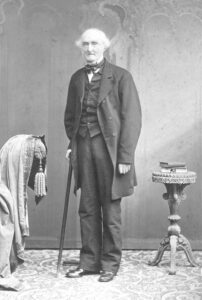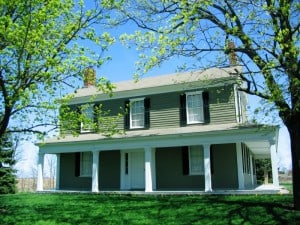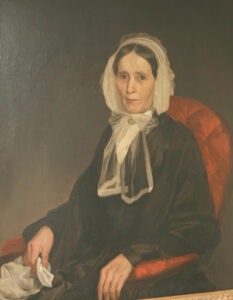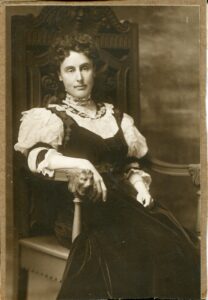Reminiscences of John Johnston
In 1821 John Johnston traveled from Scotland to the United States looking for the opportunity to build a profitable farm business. After reviewing lands in Rochester and Chicago, he purchased land in Fayette. He became the first farmer in the United States to use drain tile to improve the productivity of his land and it became one of the most important farms in the 19th Century America. Today 56 million acres of farmland in the United States has tile drainage.
2021 marks the 200th anniversary of Johnston settling in the area. The Historical Society will be commemorating the anniversary with an exhibit on Geneva Innovators (opening in June at the Geneva History Museum), blog articles, and social media posts. Below is a brief biography written by one of Johnston’s granddaughters, Agnes Swan Hutchins. She presented it as part of the memorial dedication for Johnston held on October 9, 1935. The memorial boulder is located near Johnston House at the intersection of State Route 96 and East Lake Road.
Reminiscences of John Johnston, my Grandfather of Geneva, New York, Originator of Tile Drainage in America.
By Mrs. Agnes Johnston Hutchins, Geneva, New York
 My grandfather, John Johnston was born at Knocknolling, Dalrys, Galloway (Scotland) on April 11, 1791, the oldest child of John Johnston and Agnes Proudfoot. As the children came along very fast, and there fifteen in all, young John went to live with his grandfather John Johnston of Annandale. The family had been prominent in this region for a thousand years, my grandfather’s great, great grandfather having lost his title as Earl of Annandale and his estate by adhering to the Stuarts. My grandfather grew up to manhood during the Napoleonic wars, which drained the country of its resources. After Waterloo in 1815, Scotland and England went thru a depression somewhat similar to what we have been going thru, only worse. Taxes were very high, as were living expenses and wages, and the government was miserably and dishonestly conducted, so in 1821 my grandfather, discouraged of ever seeing better days in Scotland, decided to take the little money he had saved and come to America, the goal of all the ambitious men of that period.
My grandfather, John Johnston was born at Knocknolling, Dalrys, Galloway (Scotland) on April 11, 1791, the oldest child of John Johnston and Agnes Proudfoot. As the children came along very fast, and there fifteen in all, young John went to live with his grandfather John Johnston of Annandale. The family had been prominent in this region for a thousand years, my grandfather’s great, great grandfather having lost his title as Earl of Annandale and his estate by adhering to the Stuarts. My grandfather grew up to manhood during the Napoleonic wars, which drained the country of its resources. After Waterloo in 1815, Scotland and England went thru a depression somewhat similar to what we have been going thru, only worse. Taxes were very high, as were living expenses and wages, and the government was miserably and dishonestly conducted, so in 1821 my grandfather, discouraged of ever seeing better days in Scotland, decided to take the little money he had saved and come to America, the goal of all the ambitious men of that period.
On his way to Glasgow as he rode on the top of his coach to get his packet, he saw fires burning in a field and being inquisitive, he asked why they were there. He was told that they were burning tiles to put in the ground to drain the water from the soil. On reaching Glasgow he looked into the matter and found that under-draining the soil to take the water from the land helped very much to produced good crops.
On landing in New York, he went at once to see a cousin John Taylor Johnston, who had come to New York some twenty years before, and was a very successful merchant. He advised him to go to western New York and to Geneva where Mr. Butler, also a friend lived.
My grandfather went to him for advice, and was taken by him, on a beautiful afternoon, to see the farm opposite Geneva which he afterwards purchased. He said he never forgot the beautiful sunset the first evening he saw the farm. He afterwards travelled west to Chicago, seeing Rochester where he saw at the Four Corners a farm which he could have purchased for less money than the one on Seneca Lake. However, Rochester did not compare with Geneva where a college was being built and where he was impressed with the character and intelligence of the people. Rochester, at that time, was a mudhole and many people were sick with fever and ague.

Johnston House
The sunset lured him back to Geneva and he bought the farm on Seneca Lake opposite Geneva which he owned to his death. He built a house on the farm and the next year (1822) he sent for his family consisting of his wife and two children who had remained in Scotland with his father-in-law, Mr. Alexander who had an estate at Glenhowl.
The family had lived a very pleasant, cultivated life in Scotland, and my grandmother was surrounded by relatives and friends. Mr. Alexander was very unwilling to have his daughter leave Scotland and come to the wilds of North America, which would mean a life-long separation, and opposed her coming vigorously, but my grandfather, being Scotch and a person of determination, would not give up his plan. They finally consented to his coming to America and my grandfather’s father-in-law, Mr. Alexander, asked that his daughter and children should come and stay with him. He probably hoped that my grandfather would never come back, or that he would become very much discouraged and disgusted and return home. The sequel was, however, quite different from this. My grandfather sent for my grandmother and the children the following year. They sailed with two cousins from Glasgow on the Brig Thompson early in the summer of 1822 and were three months crossing the ocean.
You can imagine my grandfather’s anxiety. They had sailed to Montreal. He wrote to the Packet Office there only to hear that the Thompson was so long over-due that they expected she had struck an iceberg and had gone down. My grandfather, consumed with anxiety, took a boat down the St. Lawrence, and on arriving at Montreal he learned from the Packet Office that they had still heard nothing of the Thompson and had given up hope of her arrival. However, he boarded the next boat for Quebec where, on entering the Packet Office at that place, they told him “Yes, the Thompson arrived several days ago with all well on board” and that it had proceeded to Montreal. The Thompson had passed my grandfather’s board in the fog of the night.
He returned at once to Montreal where he found his family. In passing through the Straits, a very dangerous place for navigators the Thompson had run into a sandbar and been injured so that they had to land at Anticosta, where they spent six weeks repairing their boat. The Indians were friendly, brought them fruit and vegetables and I have in my possession a basket, made by the Indians, that my grandmother secured while there.
After a few years of farming in America, my grandfather found that twenty bushels of wheat to the acre was all that it was possible to raise because water would stand on the clay soil and the young wheat would die out in these spots in the spring. He thought of the tile drainage in Scotland and determined to try it. He sent to Scotland for a sample of the drainage tile and then had them duplicated in a brick yard in Geneva. He drained 10 acres of land, probably in the field in front of the house. This was much to the amusement of farmers of the neighborhood who sat on the fence and laughed at what they called “Scotch Johnston’s folly.” The 10 acres of land were manured heavily, and fortunately it proved to be a good year. If you can believe me, the yield on that little piece of ground was 60 bushels to the acre where formerly 20 bushels was a bumper crop.

Margaret Johnston
In the early years, an immigration of Pennsylvania Dutch came to Seneca County and settled on government lands. These people were very ignorant. It seems almost incredible, but one day a farmer came up to my grandfather, found him standing by the well and said “Johnston, you never tell lies, and I want to ask you a question. A man told me the other day that the world was round and I said, No, the world is not round for the water never runs out of my well.” “Now,” he said, “Johnston, what do you think of that?” “But,” said my grandfather, “ the world is round.” “Well, how do you account for the fact that the water never runs of my well?” As there happened to be a pail of water standing by the well partly full of water, my grandfather took up the pail and swung it around his head, and said, “Do you see that the water did not spill out of that pail even when it was upside down? Neither does it run out of your well when it is upside down.”
My grandfather was a great reader, very reserved, reticent and unemotional. My mother said she never saw him cry but twice in her life. Once was when my grandmother was killed by lightening. She went out to the gate of their yard after a storm had passed and stood under a tree. A bolt of lightning struck the tree and she was instantly killed. My mother, who lived on the next farm (Rose Hill), went to him in great distress and found my grandfather bowed down with grief. The other time was when he heard the news of the death of Abraham Lincoln. My mother saw the newspaper first and went to tell her father the news. She found that a neighbor had already passed and had told him the news. My grandfather was pacing up and down the front field with tears running down his cheeks. He was deeply interested in politics, and the government and was a very loyal American citizen.
In the years from 1848 to 1850 there was a quite an immigration to the region of Geneva of gentlemen from New York, most of whom had been unsuccessful in business and came to buy farms. They added very much to the social life and pleasure of the community, but did not know much about farming, and never learned very much about it, most of them being past middle life when they came. We were always very much amused at one of these gentlemen who came to see my grandfather to ask “Mr. Johnston, how late can I plant my corn?” My grandfather looked at him with a smile, and said, “Well, I really do not know, I always think, “how early can I plant my corn?” (To learn more about the New York City transplants, read about John Delafield and Herman Ten Eyck Foster).

Agnes Swan Hutchins
He became an authority on farming in America and became very well known. Horace Greeley was a warm friend of his and for many years my grandfather edited the agricultural page of The Tribune which appeared once a week. About 1858 a groups of gentlemen who belonged to the New York Agricultural Society, felt that some recognition ought to be shown to grandfather for what he had done for farming. They presented him with a silver pitcher and two goblets suitably engraved, which, of course, was a source of great gratification to my grandfather. These are now in the possession of my cousin John Johnston Robertson of Bronxville.
My grandfather’s family consisted of six daughters and one son. The son died when he was about six years old, two or three years after he was brought to this country. Three of the daughters married, and three remained unmarried. These three unmarried daughters gave my grandfather devoted care in later years. He lived on his farm until he was a little more than eighty years old when he moved to Geneva, but he owned the farm until his death at Geneva in November 1880, at the age of 89.

Enjoyed this article. Great information about John Johnston